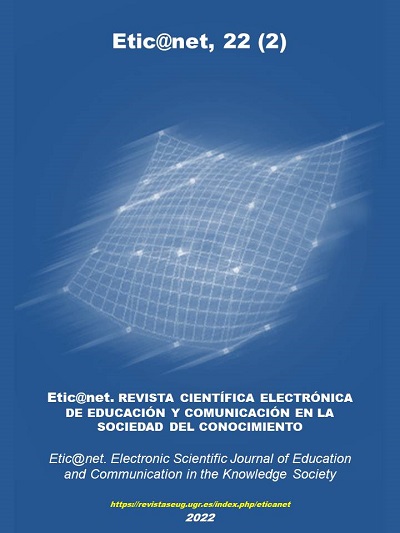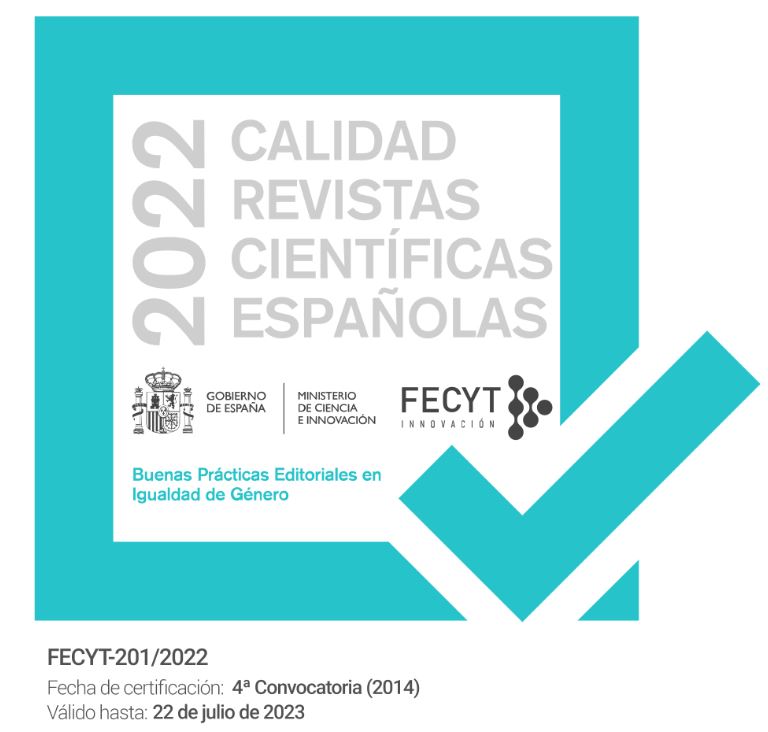COMPETENCIA DIGITAL DEL PROFESORADO UNIVERSITARIO: REVISIÓN DE LA LITERATURA
DOI:
https://doi.org/10.30827/eticanet.v22i2.25090Keywords:
digital competence, staff, higher education, literature reviewAbstract
Digital competence is becoming more prominent in an increasingly technological society, and teachers are an essential figure for teaching and learning skills and competences that involve the safe and critical use of digital tools. Therefore, it is required that teachers have adequate digital competence, especially if they are higher education teachers who train future professionals who will require, in turn, optimal development of this competence if they want to increase their employability and digital learning as citizens. Thus, this proposal is aimed at exploring the level of digital competence of university professors through a systematic review of the literature. To this end, the scientific production hosted in Scopus in the period between the month of May 2021 to the month of April 2022 has been analyzed. The results show that the development of digital competence is conditioned by variables linked to gender, previous experience, age, teaching modality, and also, with the situation caused by the pandemic.
Downloads
References
Referencias Bibliográficas
Avelar-Rodríguez, D., & Toro-Monjaraz, E. (2018). PubMed: Clinical Queries, Terminología MeSH y Operadores Booleanos. Revista De Medicina Clínica, 2(3), 96–100. https://doi.org/10.5281/zenodo.1442811
Barbazan D., Abdellah, K. & Hoyos, C. (2021). La competencia digital docente en educación superior: Estado del arte en España y Latinoamérica. Etic@net, 21(2), 267-282.
Basilotta-Gómez-Pablos, V., Matarranz, M., Casado-Aranda, L. Teachers’ digital competencies in higher education: a systematic literature review. Int J Educ Technol High Educ 19, 8 (2022). https://doi.org/10.1186/s41239-021-00312-8
(*) Cored, S., Orús, M., Toledo, S., Cosculluela, C., & Oto, S. (2021). Digital competence of university teachers of social and legal sciences from a gender perspective. Education Sciences, 11(12). https://doi.org/10.3390/educsci11120806
(*) Cabero-Almenara, J., Barroso-Osuna, J., Gutiérrez-Castillo, J. -., & Palacios-Rodríguez, A. (2021a). The teaching digital competence of health sciences teachers. A study at andalusian universities (spain). International Journal of Environmental Research and Public Health, 18(5), 1-13. https://doi.org/10.3390/ijerph18052552
(*) Cabero-Almenara, J., Barroso-Osuna, J., & Palacios-Rodríguez, A. (2021b). Digital competences of educators in health sciences: Their relationship with some variables. Educacion Medica, 22(2), 94-98. https://doi.org/10.1016/j.edumed.2020.11.014
(*) Cabral, S, Guerrero, N., y Mattar, J. (2021). Evaluación del nivel de competencia en competencias digitales de profesores de educación superior en Portugal. Educación, 46 (1), e63/1–37. https://doi.org/10.5902/1984644461414
(*) Damşa, C., Langford, M., Uehara, D., & Scherer, R. (2021). Teachers’ agency and online education in times of crisis. Computers in Human Behavior, 121. https://doi.org/10.1016/j.chb.2021.106793
(*) Erlam, G., Garrett, N., Gasteiger, N., Lau, K., Hoare, K., Agarwal, S., & Haxell, A. (2021). What really matters: Experiences of emergency remote teaching in university teaching and learning during the COVID-19 pandemic. Frontiers in Education, 6 https://doi.org/10.3389/feduc.2021.639842
Fernández-Batanero, J., Montenegro-Rueda, M., Fernández-Cerero, J. y García-Martínez, I. (2020). Digital competences for teacher professional development. Systematic review. European Journal of Teacher Education, 18, 1- 19. https://doi.org/10.1080/02619768.2020.1827389
Ferrando-Rodriguez, L, Gabarda, V y Marín-Suelves, D (2022). La competencia digital del profesorado universitario en Iberoamérica: revisión de la literatura. REIDOCREA, 11(16), 177-188. https://doi.org/10.30827/Digibug.73540
Gabarda, V., García, E., Ferrando-Rodríguez, L., y Chiappe, A. (2021). El profesorado de Educación Infantil y Primaria: formación tecnológica y competencia digital. Innoeduca.7(2), 19-31. https://doi.org/10.24310/innoeduca.2021.v7i2.12261
García-Peñalvo, F. J. (2022). Developing robust state-of-the-art reports: Systematic Literature Reviews. Education in the Knowledge Society, 23. https://doi.org/10.14201/eks.28600
(*) Guillén-Gámez, F., Cabero-Almenara, J., Llorente-Cejudo, C., & Palacios-Rodríguez, A. (2021a). Differential analysis of the years of experience of higher education teachers, their digital competence and use of digital resources: Comparative research methods. Technology, Knowledge and Learning, https://doi.org/10.1007/s10758-021-09531-4
(*) Guillén-Gámez, F., Mayorga-Fernández, M., & Contreras-Rosado, J. (2021b). Incidence of gender in the digital competence of higher education teachers in research work: Analysis with descriptive and comparative methods. Education Sciences, 11(3), 1-14. https://doi.org/10.3390/educsci11030098
(*) Heuling, L., Wild, S., & Vest, A. (2021). Digital competences of prospective engineers and science teachers: A latent profile and correspondence analysis. International Journal of Education in Mathematics, Science and Technology, 9(4), 760-782. https://doi.org/10.46328/ijemst.1831
Marimon-Martí, M., Cabero, J., Castañeda, L., Coll, C., De Oliveira, J. & Rodríguez-Triana, M. (2022). Construir el conocimiento en la era digital: retos y reflexiones. RED, 22(69). http://dx.doi.org/10.6018/red.505661
Marín-Suelves, D., Cuevas , N., y Gabarda , V. (2021). Competencia digital ciudadana: Análisis de tendencias en el ámbito educativo. RIED. Revista Iberoamericana de Educación a Distancia, 24(2), pp. 329-349. https://doi.org/10.5944/ried.24.2.30006
(*) Martín-Cuadrado, A., Lavandera-Ponce, S., Mora-Jaureguialde, B., Sánchez-Romero, C., & Pérez-Sánchez, L. (2021). Working methodology with public universities in Peru during the pandemic-continuity of virtual/online teaching and learning. Education Sciences, 11(7) https://doi.org/10.3390/educsci11070351
(*) Mercader, C., & Duran-Bellonch, M. (2021). Female higher education teachers use digital technologies more and better than they think. Digital Education Review, (40), 172-184. https://doi.org/10.1344/der.2021.40.172-184
(*) Myyry L., Kallunki V., Katajavuori N., Repo S., Tuononen T., Anttila H., Kinnunen P., Haarala-Muhonen A., Pyörälä E. (2022). COVID-19 accelerating academic teachers’ digital competence in distance teaching. Frontiers in Education, 7, 1-11 https://doi.org/10.3389/feduc.2022.770094
(*) Napal, M., Penalva-Velez, A., & Mendioroz, A.M. (2018). Development of digital competence in secondary education teachers’ training. Education in Science, 8, 104. https:// doi. org/ 10. 3390/ educsci803 0104.
(*) Nebot, M.., Cosentino, V., Esteve-Mon, F., & Adell, J. (2021). Diagnostic and educational self-assessment of the digital competence of university teachers. Nordic Journal of Digital Literacy, 16(3-4), 115-131. https://doi.org/10.18261/ISSN.1891-943X-2021-03-04-03
Quiñonez, S.; Chan, G., y Reyes, W. (2021). Desarrollo de la competencia digital en profesores universitarios. Etic@ net: Revista científica electrónica de Educación y Comunicación en la Sociedad del Conocimiento, 21(1), 83-114. http://doi.org/10.30827/eticanet.v21i1.16005
Resolución de 4 de mayo de 2022 de la Dirección General de Evaluación y Cooperación Territorial, por la que se publica el Acuerdo de la Conferencia Sectorial de Educación, sobre la actualización del marco de referencia de la competencia digital docente. Boletín Oficial del Estado. Número 116, de 16 de mayo de 2022. https://www.boe.es/eli/es/res/2022/05/04/(5)/dof/spa/pdf
Rodríguez-Hoyos, C., Fueyo, A., & Hevia Artme, I. (2021). Competencias digitales del profesorado para innovar en la docencia universitaria. Analizando el uso de los dispositivos móviles. Píxel-Bit. Revista De Medios Y Educación, 61, 71–97. https://doi.org/10.12795/pixelbit.86305
Ruiz, A., Medina, M., y Pérez, E. (2020). University teachers’ training: the Digital Competence. Pixel-Bit: Revista de medios y educación, 58, 181-215. https://doi.org/10.12795/pixelbit.74676
Sánchez-Caballé, A., Gisbert-Cervera, M. y Esteve-Mon, F. M. (2020). The digital competence of university students: A systematic review of the literature. Aloma. Revista de Psicologia, Ciències de l’Educació i de l’Esport, 38(1), 63-74. https://doi.org/10.51698/aloma.2020.38.1.63-74
(*) Sánchez, R., Cejudo, C. L., Gavira, S., & Gavira, R. (2021). Initial self-perception and level of digital competence of university teaching staff. Texto Livre, 15, 1-24. https://doi.org/35699/1983-3652.2022.36032
(*) Torres M., Martínez-Gimeno, A., Jaén-Martínez, A., & Hermosilla-Rodríguez, J. (2022). La percepción del profesorado de la Universidad Pablo de Olavide sobre su Competencia Digital Docente. Pixel-Bit. Revista de Medios y Educación, 63, 35-64. https://doi.org/10.12795/pixelbit.91943
Torres-Hernández, N., & Gallego-Arrufat, M. (2022). Indicators to assess preservice teachers’ digital competence in security: A systematic review. Education and Information Technologies, https://doi.org/10.1007/s10639-022-10978-w
Urrútia, G. y Bonfill, X. (2010). Declaración PRISMA: una propuesta para mejorar la publicación de revisiones sistemáticas y metaanálisis. Medicina clínica, 135(11), 507- 511. https://medes.com/publication/61343
(*) Vázquez, J., Náñez, S. L., Fierro, W. R., & Pacheco, S. (2021). Assessment of digital competencies of university faculty and their conditioning factors: Case study in a technological adoption context. Education Sciences, 11(10). https://doi.org/10.3390/educsci11100637
Vera, O. (2009). Cómo escribir artículos de revisión. Revista Médica La Paz, 15(1), 63-69.
Viñoles-Cosentino, V., Sánchez-Caballé, A. y Esteve-Mon, F. M. (2022). Desarrollo de la competencia digital docente en contextos universitarios. Una
revisión sistemática. REICE. Revista Iberoamericana sobre Calidad, Eficacia y Cambio en Educación, 20(2), 11-27.
https://doi.org/10.15366/reice2022.20.2.001
Viñoles-Cosentino, V., Sánchez-Caballé, A. y Esteve-Mon, F. M. (2022). Desarrollo de la competencia digital docente en contextos universitarios. Una revisión sistemática. REICE. Revista Iberoamericana sobre Calidad, Eficacia y Cambio en Educación, 20(2), 11-27. https://doi.org/10.15366/reice2022.20.2.001
(*) Zhao, Y., Pinto, A., Sánchez, M., & Zhao, L. (2021). The impact of gender and years of teaching experience on college teachers’ digital competence: An empirical study on teachers in gansu agricultural university. Sustainability, 13(8). https://doi.org/10.3390/su13084163
(*) Artículos incluidos en la revisión sistemática.
Published
Issue
Section
License
The authors who publish in this journal agree to the following terms: The authors retain the copyright and grant the journal the right to be the first publication of the work as well as licensed under a Creative Commons Attribution License that allows others to share the work with an acknowledgment of the authorship of the work and the initial publication in this magazine. Authors are allowed and encouraged to disseminate their work electronically (for example, in institutional repositories or on their own website) before and during the submission process, as it may lead to productive exchanges as well as further citation. Earliest and greatest of published works (See The Effect of Open Access).













